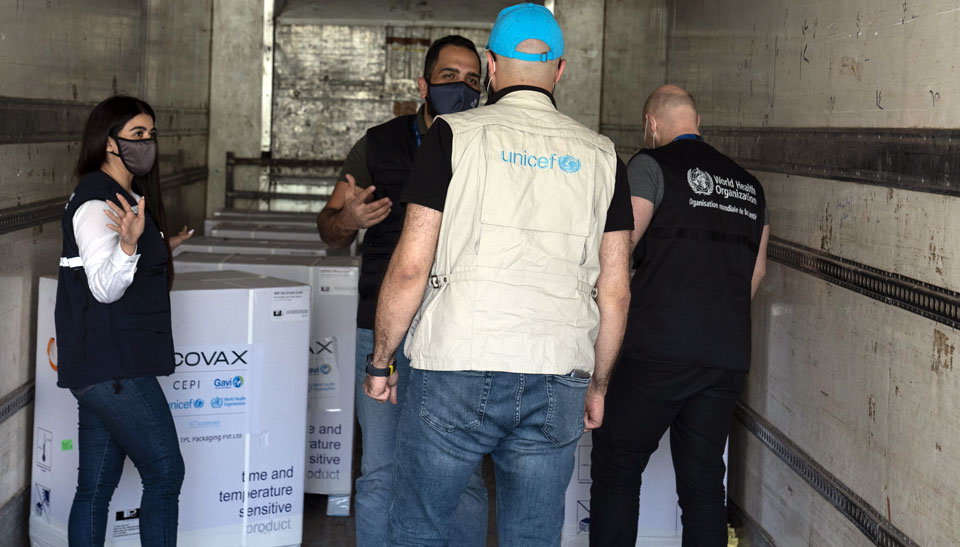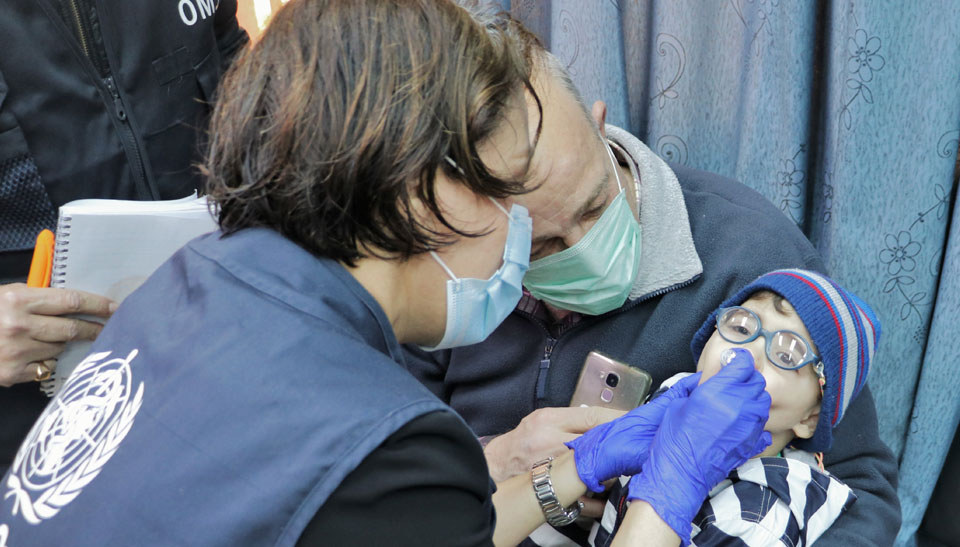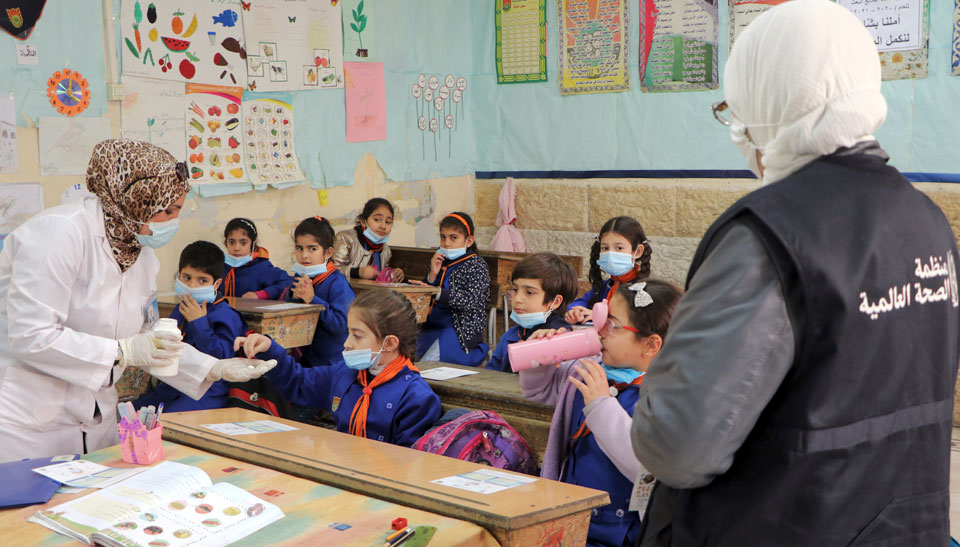Syria receives first batch of COVID-19 vaccines through COVAX Facility

DAMASCUS, 22 April 2021 – 203 000 doses of the Astra Zeneca vaccine from the Serum Institute of India arrived in Damascus today through the COVAX Facility. This first batch of the vaccines will be allocated to frontline health workers, including health workers in northeast Syria. Simultaneously, a separate batch of 53 800 doses of Astra Zeneca vaccines for the high-risk populations in northwest Syria is also shipped through WHO and UNICEF offices in Gaziantep.
Under the COVAX Facility, Syria is one of the 92 countries eligible for advance market distribution of COVID-19 vaccines. In coordination with GAVI - the Vaccine Alliance, WHO and UNICEF are providing detailed technical support to the national health authority in Syria to launch the national vaccination campaign later this month.
“This is an important milestone in our collective fight against the pandemic. Delivery of the COVID-19 vaccines by COVAX and partners brings us closer to vaccine equity and gives hope for the people in Syria, whose lives have been shattered by a decade of conflict and the devastating impact of the pandemic. With the vaccines delivered through this first batch and with future deliveries planned for this year we hope that by end of 2021, health workers, the elderly and people with chronic diseases – that is 20% of the population – will be protected from COVID-19 and its complications,” said Dr Akjemal Magtymova, Head of Mission and WHO Representative in Syria. “National partners, the Serum Institute of India, GAVI, UNICEF and WHO have put all the efforts to bring COVID-19 vaccines to Syria, and we are grateful for this partnership and its tangible results.”
“This is a great day of hope. The imminent roll-out of the vaccines will bring protection to health workers, who continue their lifesaving work amid the pandemic. Every health worker who will get vaccinated will be better protected to attend to children’s and families’ health needs who have endured the impact of this pandemic in many forms,” said Bo Viktor Nylund, UNICEF Representative in Syria. “We are particularly grateful to the Government of India for facilitating the delivery of this urgently needed consignment of the COVID-19 vaccines. We continue to urge wealthier nations to continue working with WHO, UNICEF and COVAX to get vaccines as soon as possible to vulnerable communities in conflict-ravaged countries like Syria. No one is safe until everyone is safe.”
“Today is a historic day for Syria and its fight against COVID-19,” said Dr Tarek Elshimi, Gavi Senior Country Manager for Syria. “This delivery is the result of an unprecedented global partnership to ensure no country is forced to go without COVID-19 vaccines and represents a vital effort in tackling this pandemic.”
WHO, UNICEF and health partners on the ground are committed to ensure equitable distribution of vaccines to the target groups in Syria and support the upcoming vaccination campaign.
COVAX is co-led by Gavi, the Vaccine Alliance, the World Health Organization (WHO) and the Coalition for Epidemic Preparedness Innovations (CEPI), working in partnership with UNICEF, as well as the World Bank, civil society organizations, manufacturers, and others. COVAX is part of the Access to COVID-19 Tools (ACT) Accelerator, a ground-breaking global collaboration to accelerate development, production, and equitable access to COVID-19 tests, treatments, and vaccines.
COVAX has built a diverse portfolio of vaccines suitable for a range of settings and populations, and is on track to meet its goal of delivering at least 2 billion doses of vaccine to participating countries around the globe in 2021, including at least 1.3 billion donor-funded doses to the 92 lower-income COVAX Facility participants supported by the Gavi COVAX AMC.
Notes to Editors
COVAX is a partnership between CEPI, Gavi, UNICEF and WHO.
Full COVAX news note to editors
List of donor pledges to the Gavi COVAX AMC
Funding tracker for the ACT Accelerator, which includes details of funding for COVAX
Live updates on the COVAX vaccine roll-out globally
Media contacts
Gulalek Soltanova
WHO Syria Chief of Communication
+963 (0) 953888477
Salam Al-Janabi
UNICEF Syria Chief of Communication
+963 (0) 950044371
Related links
COVID-19 vaccine
WHO in Syria capacitates community workers to launch a campaign on psychosocial support to parents and caregivers in the context of COVID-19

18 April 2021 - In Syria, approximately one in 10 people is expected to be living with a mild to moderate mental health condition, while 1 in 30 is likely to suffer from a more severe condition. Prolonged exposure to conflict increased the prevalence of mental health conditions. COVID-19 has added more strain to the mental wellbeing of families in Syria. In 2020 only, WHO provided over 220 thousand mental health consultations and services through integrated community-based services – either through mobile clinics or through family wellbeing centres across the country.
In 2020, WHO Syria, as a member of the Inter-Agency Standing Committee Reference Group on Mental Health and Psychosocial Support in Emergency Settings (IASC MHPSS RG), supported the development of “My Hero is You”, a story telling book for children. The project was supported by global, regional and country based experts from member agencies of the IASC MHPSS RG, in addition to parents, caregivers, teachers and children in 104 countries. The book was designed to support children and parents who had anxieties and fears associated with COVID-19. In a short time, “My Hero is You” gained so much popularity, that it was translated into many languages of the world, including Arabic.
WHO Syria’s Mental Health team went further to adapt the book as a colouring book. The team believed in the healing power of innovative and interactive interventions, such as arts, on children and on families. The Syrian adaptation in English and Arabic are now available for the global audience on the IASC website.
To make the colouring book available to children and families in Syria who in its majority do not have access to online resources in rural places, WHO Syria printed out the publication in the framework of the Regional Solidarity Initiative and plans to distribute them in two pilot districts in Rural Damascus. Through 10 outreach teams of community workers from two NGOs, mainly, Inaash Al-Fakeer Association and Al-Qutayfah Association, WHO Syria plans to reach communities – parents, caregivers and children. The NGOs will not only distribute the colouring book and crayons to children, but will also provide psycho-social support sessions to parents and caregivers and teach them how to talk to children who have fears.
NGOs, with the support of the Ministry of Health, Ministry of Social Affairs and Labour, and WHO will implement the campaign to deliver mental health and psycho-social support messages about how to cope with stress and how to enhance wellbeing for oneself and others. The campaign will also provide direct services with a special focus on combating the dual social stigma related to mental health and COVID-19 response.
Prior to the campaign launch, from 4 to 15 April 2021, NGO outreach teams of about 80 volunteers underwent training by WHO on COVID-19 response focusing on risk communication and community engagement (RCCE), infection prevention and control (IPC), mental health and psycho-social support (MHPSS), as well as basic psycho-social skills for COVID-19 responders as mandated by the updated version of WHO Clinical Management Guideline.
“As adults, we sometimes forget how hard it is being a child. When we see an adolescent, who has difficulties at school, we may think he does not put extra efforts to study, or it is natural for adolescents to behave this way. But what we do not realize oftentimes is that the child may be going through a mental health crisis. We need to help those children to overcome the stress and we can start by simply asking “How can I help you?”. It is a powerful question indeed to start the conversation and listen to the child,” said Latif, 30-year-old primary teacher who participated at the training.
Another participant, twenty-nine-year-old Majdi from Rural Damascus said, “This training has taught me to pose the question as “How can I help?” as opposed to “What’s wrong with you?”
“Mental health remains one of the most neglected areas of public health. This training provides me with a lot of essential information to help children to cope with their fears in the context of COVID-19” said Hwazen (30 years old, doctor) one of the participants.
Many Syrian adults report that their and their children’s well-being and future potential constitute the greatest source of stress. In addition, the COVID-19 pandemic has added to their already shattered mental health.
“People of Syria share how the war dramatically affected their lives and psychological wellbeing. Thus, mental health services are key to building resilience and positive coping strategies for children, adolescents and adults,” said Dr Akjemal Magtymova, Head of Mission and WHO Representative in Syria.
Now, that the community volunteers are empowered and capacitated, they will launch the campaign using “My Hero is You” colouring book and reaching around five thousand children, hundreds of parents and caregivers and school health educators in the Rural Damascus governorate. Awareness raising sessions on COVID-19 prevention measures and coping with stress strategies will be part of the campaign, as well as focus group discussions with parents and caregivers and dedicated sessions with children, all of which will lead to empowering communities in Syria and strengthening their resilience and mental health.
Related link
Keeping Syria polio-free requires sustained commitment

9 April 2021 - Amidst a decade-long conflict, economic crisis and political upheaval, WHO continues to support strengthening public health programmes and implementation of immunization activities, national polio vaccination campaigns and surveillance for acute flaccid paralysis.
In the middle of March 2021, a national polio immunization campaign concluded, reaching 2.5 million children under the age of five in all 14 governorates of Syria, including high-risk areas of the eastern Euphrates, refugee and IDP camps, and nomadic areas.
“Since Syria is close to countries that are at high risk of polio outbreaks, it is very important to maintain a high immunity barrier for children of age 0–59 months against polio,” said Dr Akjemal Magtymova, WHO Representative to the Syrian Arab Republic. “Last year, we didn’t have any outbreaks of polio or other vaccine-preventable diseases, so this campaign is crucial to sustain the momentum gained.”
Over 10 000 trained health workers and supervisors were mobilized during the campaign, working at the local and governorate level. WHO provided logistical support to ensure the smooth implementation of the campaign. This meant everything from facilitating refresher training for health workers and supervisors, to delivering the vaccines across Syria and transporting mobile vaccination teams and supervisors to just about every part of the country.
As has become standard with mass vaccination activities, COVID-19 preventive measures were strictly followed during the campaign, including physical distancing and the use of gloves, sanitizer, masks and other equipment. With the financial support of Gavi, the Vaccine Alliance, WHO provided personal protective equipment to all vaccinators working through Syria’s Expanded Programme on Immunization (EPI).
Syria has seen a drop in vaccination coverage for multiple antigens over recent years due to the sharp reduction in trained health workers and technical experts and the widespread destruction of infrastructure, including vaccination centres. Raising the immunity level to all vaccine-preventable diseases is a priority, but also a challenge.
Last year, Syria conducted two full national immunization campaigns and one subnational polio campaign.
“Insecurity in Syria is a serious impediment to reaching targeted children with polio vaccine. However, we have managed to reach and vaccinate children to prevent polio re-occurrence in Syria, especially at these times of COVID-19, where there is a risk of under-immunized children,” said Dr Magtymova.
|
Date of polio campaign (OPV) |
Targeted U5 children |
U5 vaccinated |
Reported coverage |
Post-campaign monitoring |
|
16–20 February 2020 |
2 804 279 |
2 652 471 |
95% |
89% |
|
19–23 July 2020 |
948 381 |
972 984 |
102.6% |
89% |
|
11–15 October 2020 |
2 804 279 |
2 553 658 |
91.1% |
92% |
WHO-supported deworming campaign reaches millions of children in Syria

Reflection of Michael Atieh, WHO Syrian Arab Republic country office staff member
8 April 2021 - Children go running around playing with each other daily without a worry in mind. They play in the sand, dirt, mud and wherever else their imaginative young minds take them. However, consequences arise when improper sanitation is part of a child’s daily routine. Since these children are young and may not be attentive, they become the most likely victims of intestinal worms. These intestinal worms are transmitted by worm’s eggs present in human faeces, which in turn contaminate soil in areas where sanitation is poor. Consequently, we see intestinal worms affect severely impoverished and hygiene-deprived communities.
Intestinal worms can come in many different shapes and sizes and most commonly cause nausea, fatigue, restlessness, abdominal pain, and weight loss. As a result, if not treated immediately, it can have a devastating effect on a child’s future. Long-term consequences of intestinal worms include cognitive disabilities, anaemia, and growth impairment.
After 10 years of conflict, Syria has become a fertile land for intestinal worms to thrive. Poor sanitation has become the norm in many areas throughout the country, mainly due to either lack of proper water and sanitation infrastructure or lack of education on hygiene.
During the past five years, to fulfil its mandate to provide health services to all people in need, WHO, in close collaboration with the Ministry of Health and the Ministry of Education, has supported four soil-transmitted helminths deworming campaigns in Syria. This year’s four-week deworming campaign took place in March targeting 3 036 000 school children from all governorates.
The campaign revealed that the key concern for schools is water distribution. Since there is no clean water, the students cannot properly wash their hands after playing outside, thus creating a higher probability for transmission. The deworming medication provided to schoolchildren was very helpful. However other external factors causing the transmission of worms need to be further addressed.
WHO has played a vital role in eradicating intestinal worms. For over 70 years, thanks to WHO, numerous campaigns have been launched and several committees have been formed tackle to the issue. As a result, in 2001, WHO announced that 75% of school children in endemic areas were receiving deworming treatment. However, worms have not been completely eradicated, as they still affect over 2 billion people worldwide. The work preventing intestinal worms needs to continue.


